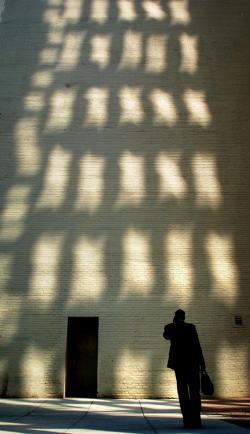In a 2-1 ruling on Tuesday, the 5th U.S. Circuit Court of Appeals gave the Justice Department a welcomed gift: the unfettered authority to collect location records from cellphones without a search warrant. According to the federal appeals court, the Fourth Amendment’s proscription on “unreasonable searches and seizures” doesn’t apply to cellphone records at all for the simple reason that “the Government does not require a member of the public to own or carry a phone.”
Don’t want the government to constantly monitor your whereabouts by searching your cellphone records without a warrant? The 5th Circuit has an easy solution: Throw away your phone.
Weird as that ruling may sound, the circuit court was dealing with some wacky precedents. The Supreme Court first laid out modern Fourth Amendment jurisprudence in 1967’s Katz v. United States, which offered generations of befuddled law students (and judges) the “reasonable expectation of privacy” test: Basically, if society deems a presumption of privacy “reasonable,” then the government needs a warrant to violate it. (Thus, warrantless trash search is OK, while warrantless wiretap is not.) And as the definition of a “reasonable expectation” has shifted with developing technology, the court has declared an ever-expanding class of searches—Drug-sniffing dogs! Thermal imaging!—unreasonable.
Of course that’s proven a pretty tricky task for a group of justices who don’t know the difference between email and a pager. But it gets even thornier when the “reasonable expectation” deals with data, as opposed to physical places. Two terms ago, the court had an opportunity to clarify the constitutionality of warrantless data-based location monitoring in United States v. Jones—but the justices ultimately ducked the question in favor of a narrow ruling. At issue in Jones was a small GPS tracker, which police attached to Jones’ wife’s car for 28 days, far exceeding the 10-day period granted by their warrant. The cops then used the resulting information to locate and raid Jones’ “stash house.” Jones argued that he had a reasonable expectation of privacy in his car. Justice Antonin Scalia—joined by Justice Clarence Thomas, Justice Anthony Kennedy, Chief Justice John Roberts, and Justice Sonia Sotomayor—agreed, holding that the placement of the GPS tracker itself constituted an “unreasonable search,” thus reversing Jones’ conviction.
Yet four other justices—Justice Samuel Alito, Justice Ruth Bader Ginsburg, Justice Stephen Breyer, and Justice Elena Kagan—objected to the narrowness of the majority’s holding. They also believed the search violated the Constitution, but not just because the tracker was stuck on Jones’ car. In a dissent-like concurrence with Scalia’s majority opinion, Alito—yes, that Alito—mocked the majority for relying on “18th-century tort law” to resolve this case, arguing instead for a broader right to privacy in an age of wildly intrusive technologies. “New technology,” Alito argued, “may provide increased convenience or security at the expense of privacy, and many people may find the tradeoff worthwhile.”
Personal trade-offs between privacy and technology are, of course, risks we generally choose to accept—just ask Anthony Weiner. But what about constitutional trade-offs? As Slate’s Dahlia Lithwick noted when Jones was announced, Alito “worries not only about surveillance and privacy, but also at the public acceptance of raw deals.” And, as Jeffrey Rosen has pointed out, the justice has long served as “America’s privacy cop,” valuing decency and personal anonymity over, well, pretty much anything else. It makes sense, then, that Alito’s Jones concurrence would cast a deeply skeptical eye on warrantless data monitoring, stating that “society’s expectation has been that law enforcement agents and others would not … secretly monitor and catalogue” someone’s “every single movement.” It’s not just whether people expect to have their data stolen. That’s only half the question. The question for him is why we have come to expect such a thing in the modern era.
So where does that leave Tuesday’s cellphone ruling? For now it’s the law in that jurisdiction. Jones, of course, dealt with a GPS tracker, not a cellphone, but Alito explicitly expanded his high-tech privacy principle to “cell phones and other wireless devices.” That makes four votes—Alito plus his more liberal Jones colleagues—Ginsburg, Breyer, and Kagan—to erect a much higher constitutional barrier around warrantless data tracking, by reversing the lower court’s cellphone decision. And those four want to see this question resolved squarely, not just fobbed off onto another court in 10 years’ time.
This scrambled ideological alliance could surely find a fifth vote in Sotomayor, whose own concurrence in Jones also raised alarm bells at the prospect of limitless government data searches. Sotomayor admonished the court to “reconsider the premise that an individual has no reasonable expectation of privacy in information voluntarily disclosed to third parties”—information such as cellphone data. Thus, despite joining Jones’ majority opinion for its “narrower basis,” Sotomayor is a very likely vote for creating a new rule that would ensure greater digital privacy protections.
Interpreting the auguries of a splintered decision like Jones no doubt entails a certain amount of guesswork. But when five members of the court signal their desire to bolster high-tech privacy, it’s not hard to read the tea leaves. The 5th Circuit’s cellphone ruling is almost certain to be reversed in the near future, barring a dramatic change of heart from one of the Supreme Court’s privacy lovers. Don’t throw away your cellphone quite yet: There’s still hope for privacy, and its name is Justice Alito.
